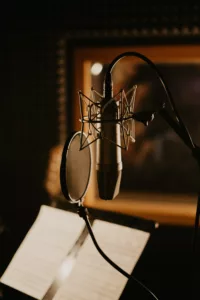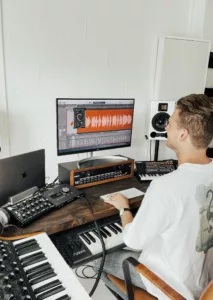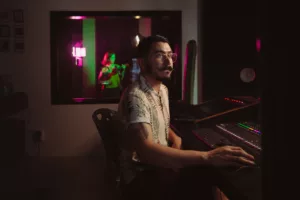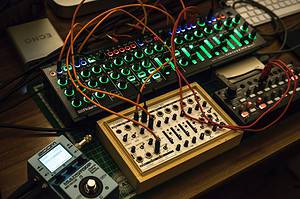
Giving Musicians the Tools to Make Better Music
Are Music Production Courses Worth It?
Are Music Production Courses Worth It?
Is it worth spending money on a course that might not teach you exactly what you need?
There’s not a clear answer, but in this article I’ll dive into all the reasons it would be worth it to take them and all the reasons why it wouldn’t.
Whether you want to become a professional audio engineer, create your own beats and songs, or just have fun making music, taking a course in music production can be extremely beneficial. Taking courses in music production will give you access to a wealth of knowledge and resources that will help you create your own unique sound. But it should also be said that music production courses aren’t right for everyone.
In this article, I’ll talk about all the benefits taking a music production course can give to aspiring producers! Then I’ll talk about when it might not make sense to buy them!
Here are some benefits music production courses provide:
- Learning Music Production is Creative
- Producing Music is fun
- Producing Yourself is cheaper than paying others to do it
- Learning Production is Hard on Your Own
- Connecting with Music Industry Professionals
- Learning Production is the best way to make ‘your’ music
- Taking Courses Will Improve Your Skills Fast
Producing Yourself Is Creative
If you’re reading this, chances are you enjoy being creative! One of the best parts of music production is the creativity that comes with it! Producing your own music is a creative act that requires knowledge, skill, and practice. By taking courses in production, you can build up your skill set and learn the techniques used by professional producers to create their own unique sound.
It’s fun to make your own sounds and songs
Producing music is a great way to have fun and express your creativity. Learning how to produce music can quickly turn into something you enjoy doing! It’s just plain fun to make your own beats and songs! And I can tell you from personal experience, the better you are at doing it, the more satisfying it is to get to the end product!
Allow you to develop as an artist
By learning how to build tracks from the ground up, you can get an understanding of the various elements that go into creating music and how they all interact. Through studying production, you can become familiar with diverse sounds and experiment with different styles. This can lead to creative breakthroughs and the discovery of unique styles that are all your own.
It isn’t until you understand the nuances of music production that you develop your own sound! And the best way to do that is with professional guidance!
Producing Yourself is Cheaper
Saving money is always a plus! Taking courses in music production will help you develop the skills to produce your own music with minimal outside assistance. Having someone else produce your music can be expensive and often times you don’t get the exact sound you want. With production courses, however, you can take charge of your sound and save yourself some cash along the way!
Studio time is expensive
Gone are the days of recording music in your bedroom. The cost of studio time has skyrocketed, with some studios charging upwards of $150 an hour! That can be a tough pill to swallow if you’re just getting started in production and don’t have the budget for it. But investing in production courses means you can learn how to make great sounding music without breaking the bank on studio fees.
So, is taking a course in music production worth it? If you’re looking to become a professional producer or simply hone your skills as an artist, then yes – definitely! With courses, you’ll get access to invaluable knowledge and resources that will help take your productions to the next level. Plus, it’s much cheaper than paying someone else to do it!
Getting started doesn’t cost a lot
Many music production courses are designed with the beginner in mind – they provide you with everything you need to get started at an affordable price. This can help alleviate some of the financial burden associated with starting out in production. Creating great music can be achieved for less than $1000!
So if you’re looking for a great way to develop your skills as a producer and save money at the same time, then taking a music production course is definitely worth considering! You’ll gain invaluable knowledge that will help bring your productions to life and make them sound even better than before. It’s a win-win situation!
Production is Hard to Learn
Music production is hard to learn. It’s not something you can pick up overnight; mastering the tools and techniques of music production requires dedication and hard work. Even with great resources and tutorials, there are still things that will take practice and trial-and-error to understand. That’s why taking courses in music production is such a great way to get started – it provides the knowledge and guidance needed to become proficient in production without having to go through months or even years of trial-and-error!
Having professional guidance will guide you through the things that are important for you to know in your genre! Professionals can hear the sound you’re creating and where it lacks!
There are a lot of complicated things to learn
Here are just 5 of the more basic production techniques that you must learn:
1. Compression
2. EQ
3. Reverb
4. Automation
5. Mixing and Mastering Techniques
Music production is no easy task, and it takes a lot of time to perfect your techniques to create the sound you want. From understanding software tools to mixing and mastering techniques, there are many complex things to master! Professional help all makes it so much easier to learn those concepts!
Your ears need direction
Developing your ear for music production is key to becoming a successful producer. The most important tool you have at your disposal as a producer is your ears, and learning how to use them effectively can be the difference between creating good music or great music.
Well, how can you develop your ear so that it’s on par with the professionals? One way is to put in thousands of hours of practice to get to where you want! Or another is to have specific guidance from professionals through courses or lessons! Professionals can provide immediate and corrective feedback when dealing with compression and EQ or any other part of the music production process!
Connecting with Music Industry Professionals
Networking is key in the music industry! Taking a course can help you connect with professionals who can offer advice on your productions and who can introduce you to the right people. It’s not what you know, it’s who you know! You’ll be able to collaborate with other producers and make connections with record labels, which could lead to some great opportunities.
Having access to these resources can open up doors that may have been closed before! It’s an invaluable part of taking a music production course – it can provide the networking opportunities that you need to advance your career.
Networking is the number one reason I’ve considered going back to music school! There’s nothing that can substitute the power of relationships with like-minded people in the same industry!
Why is networking in music important?
Networking is important in music for so many reasons! Here some of the ways getting involved with fellow producers can help:
1. Connects you with people in the same industry
2. Helps give access to resources that may have been closed before
3. Creates opportunities to collaborate with other producers
4. Builds relationships and connections with record labels
5. Gives advice on music production techniques
6. Provides constructive feedback on music productions
7. Opportunity to gain new knowledge through professionals in the field
8. Increases chances of success as a musician or producer
9. Helps increase visibility for your work by making important contacts
10. Allows for feedback from other experienced musicians
Doesn’t that seem like a good list of benefits? I’d say so!!
It’s the Best Way to Make Your Music
As an artist, you need to make sure that your music stands apart from other artists in your genre and one of the best ways to do this is through music production courses. Music production courses can teach you how to create sounds nobody has ever heard before or recreate classic sounds with modern touches. Having a professional help guide you through the process and offer feedback on your work can help you develop your own signature sound. Not only will this set you apart from other artists, but it could also lead to more success as an artist because people will be drawn to something distinctive and different. So don’t let yourself blend into obscurity – use these courses as an opportunity to have all the tools you need to create great music.
You’ll Get Better Fast!
With professional guidance and feedback, you can learn music production techniques much faster than if you were to try it on your own. Professional help allows for more focused learning that can help improve your skills quickly and efficiently.
Without professional help, learning music production techniques can be a difficult task. It requires patience and dedication to develop the skills necessary to create great music.
Timeline for Developing Music Production Skill
Year 1 – Learn the Basics: The first year of learning music production should focus on the basics. This includes understanding the fundamentals of sound and digital audio, as well as getting familiar with the major components and tools used in music production. It’s also important to understand how different parts of a track work together to create a cohesive sound!
Year 2- Getting Better: This is when music producers can begin to apply their knowledge and refine their skills. This is the year that they really start to dive into the fundamentals of production, such as mixing and mastering, sound engineering, and recording techniques. During this time, they should also become familiar with different software packages and hardware components used in production.
Year 3- More Improvement: Year 3 is when music producers really get to hone their craft and learn more advanced music production techniques. During this time, they should be focusing on the finer details of music production such as mixing, mastering, sound design, and creating layered effects. Producers should also spend this time exploring different audio tools and plugins to further develop their skills.
Year 4- Professional Yet? Year 4 is when music producers can really begin to specialize and refine their skills. Artists will start to develop their sound. During this year, they should focus on honing their craft by mastering the more advanced techniques of production, such as using synthesizers, samplers and virtual instruments to create complex soundscapes and intricate musical arrangements. In addition, they should also be experimenting with new sounds and genres to create a unique personal sound!
Keep in mind that all of these timelines are completely dependent on how much practice time you put in! If you spend hours behind the mixing desk every day and treat it like a real job, then these years are completely acheivable! If you produce things on the side for fun, that’s great to! Just know it might take more time to get that professional sound!
Who Shouldn’t Take Music Courses?
Now that brings me to a different part of the article! I’ve been taking and raving about the benefits of music courses and lessons, but really they aren’t for everyone! People who have already mastered the basics of music production, and people who are uninterested in learning about the technical aspects of music production should probably avoid these courses.
For example, if you’re an artist that simply wants to create music without getting bogged down in the details, then a course might be a bit too much for you. Let me go over some people who might not be a good fit for music production lessons and courses below
People who do it as a side hobby
Producing music is a great side hobby! But if a person isn’t serious about getting better at the craft and turning it into a full-time job, then spending the money on music production lessons or music production courses might not make sense!
There’s nothing wrong with spending an hour or to here and there making some music for yourself! In fact, I’d recommend everybody try it! It’s so fun to be able to make unique music! But if in 5 years you see yourself as a music production hobbyist rather than a music production professional, then it might make more sense to hold off on spending the time and money on courses and tutors.
People who lack the motivation
Music producing is a long and often challenging endeavor. If you don’t have the right mindset and motivation to really take on the project, then music courses might not be for you! It takes special dedication and commitment in order to make it through the seemingly endless hours of learning about sound engineering, mixing, mastering, and all sorts of other technical aspects!
If you don’t really have the energy to dedicate yourself to getting better at music production, then it might be best to hold off on taking music courses. It’s a comittment! Come back when you’re ready!
The Bottom Line
Music courses and lessons can be incredibly helpful for aspiring music producers hoping to hone their craft and perfect their sound. They can provide so many benefits to those that take them and they can fast-track their career! However, they may not be the right fit for everyone. Hopefully, this article has given you a better idea of what to expect from music courses!
Check Out The Rest of Our Blog!
Mattie
Post Info
Join "5 Beat Friday"
Every week you'll get 5 beats about the production world. Join the over 5,000+ other producers bettering themselves through 5 Beat Friday!




